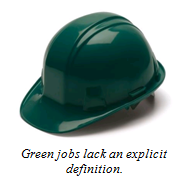By Kevin Mooney
What is a green job?
That question has a special relevance here in the early part of 2011 now that Team Obama has altered its environmental strategy.
When he campaigned in 2008, President Obama said he would create 5 million new green collar jobs. Even if you do not accept the premise of man-made global warming, it is necessary for the U.S. to transition away from traditional energy sources and embrace new, clean energy technology that create new employment opportunities, Obama declared in his first State of the Union address.
“I know that there are those who disagree with the overwhelming scientific evidence on climate change, Obama said. “But here’s the thing — even if you doubt the evidence, providing incentives for energy-efficiency and clean energy are the right thing to do for our future — because the nation that leads the clean energy economy will be the nation that leads the global economy. And America must be that nation.”
On Tuesday, Obama continued his environmental pitch by asking Congress to mandate 80 percent of U.S. electricity come from ‘clean energy’ by 2035. Even with the the demise of “cap and trade” on Capitol Hill, it is now evident the administration remains irrevocably committed to interventionist polices that will ultimately translate into higher costs. The Institute for Energy Research (IER) has issued a report that shows electricity prices are almost 40 percent higher in states that have renewable mandates. Americans who live in the more industrialized areas have good cause to be concerned about policies that could unsettle cheap energy sources.
Thanks to the concerted efforts of various free market groups the public quite rightly came to identify “cap and trade” with “energy rationing” and “higher taxes.” But the repackaged environmental scheme Obama discussed in his second SOTU address is just as menacing to the free market. Benign sounding phrases like “green jobs” belie hard economic realities that deserve greater scrutiny.
Generally speaking, green jobs intersect with the same renewable energy sources that Obama Administration officials favor as a substitute for fossil fuels. But there is no clear definition.
Ben Lieberman, an analyst with the Competitive Enterprise Institute (CEI) has identified some key complications. “Some jobs are only occasionally green,” he has noted. “For example, workers who produce steel or cement are counted as having green jobs to the extent their products go into making wind turbines — but not when they go into coal-fired power plants.” Moreover, he points out, the definition becomes highly malleable once politics figures into the equation.
“In truth, the definition of a green job is highly subjective and can depend every bit as much on fads and fashions and political correctness as on any objective criteria,” Lieberman has observed. “Of course, now that federal money is involved, various special interests are vying to characterize themselves as green.”
However they are defined, there is no escaping the economic fallout from government policies that prop up green jobs, which would not otherwise be sustainable in the free market.
“To a large extent, the green jobs agenda represents the Europeanization and the Californiazation of the American Economy,” Lieberman has noted. That is bad news for job growth.”
Obama has cited Spain as model for the clean energy economy of the future. But here again, facts and economic realities intrude. Gabriel Calzada, an economics professor at Universidad Rey Juan Carlos in Spain, has produced a study that shows green jobs are mostly temporary, heavily subsidized and subtract away from economic performance.
Kevin Mooney is a contributing editor to Americans for Limited Government.


